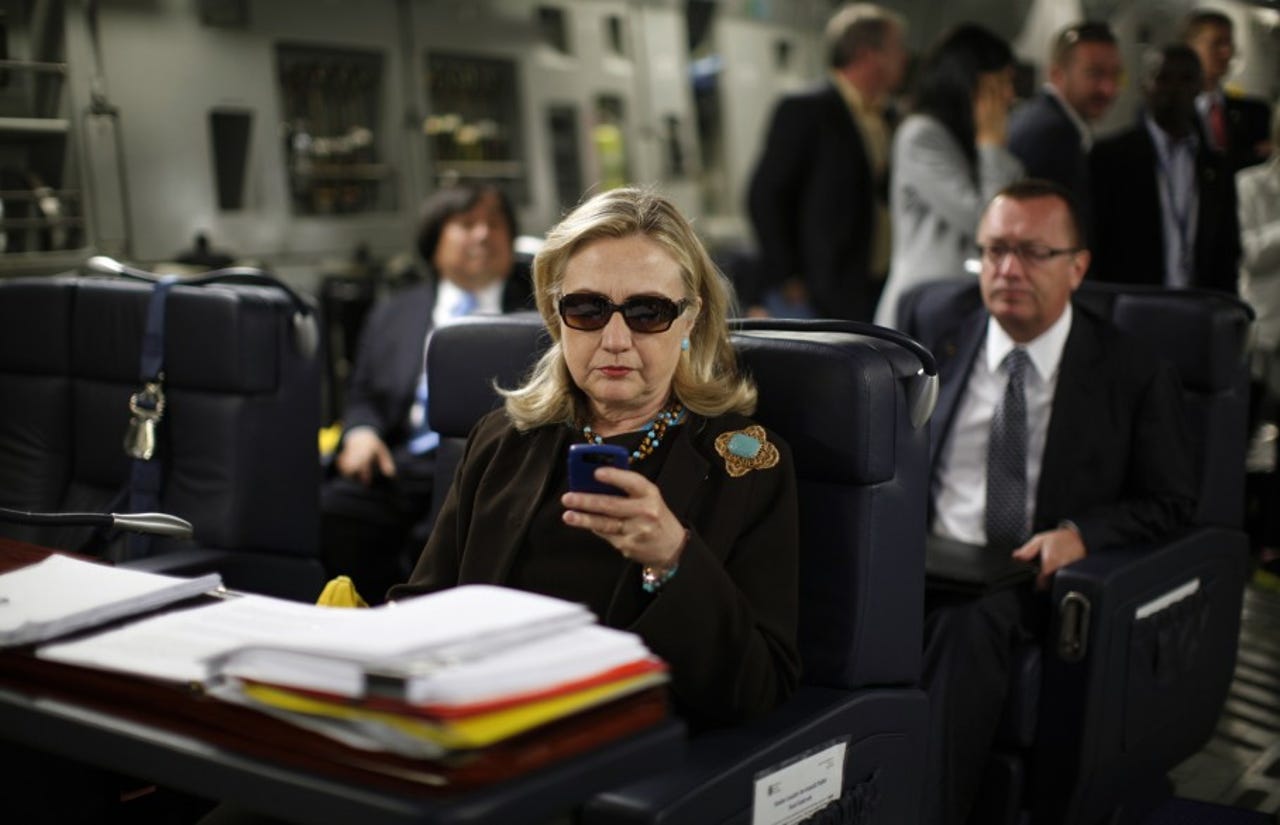Clinton broke email rules, says watchdog: Four things you need to know


A federal watchdog has issued a highly critical report of Hillary Clinton's use of a private emails server while head of the State Department.
The 83-page report published by the department's Office of the Inspector General found "longstanding, systemic weaknesses" relating to electronic records keeping, archiving, and poor cybersecurity practices.
The report was started prior to Clinton's appointment in 2009, but had significant focus on her time as secretary of state, a position she left in 2013.
The report said that her use of a private email server was "not an appropriate method" for preserving records and emails, given that the department and its staff were subject to federal rules requiring strict records keeping.
"At a minimum, Secretary Clinton should have surrendered all emails dealing with Department issues before leaving government service," said the report. "Because she did not do so, she did not comply with the Department's policies that were implemented in accordance with the Federal Records Act," it added.
Clinton later provided the records in 2014, a year after her post ended. Dozens of those emails were considered "secret" or the highest level of classification, "top secret."
The former secretary of state is expected to be nominated as the Democratic presidential candidate in the coming weeks.
You can read the full report. Here's what we found:
1. Clinton's email server was attacked numerous times
Clinton, who is currently running for president, said amid the brouhaha on her campaign website that the private email server was not hacked.
"No, there is no evidence there was ever a breach," reads the website. A campaign spokesperson said earlier this year that the Clinton team was "not aware of any evidence whatsoever" that the server had been hacked.
However, the inspector general's report said there were a number of attacks against the server:
"On January 9, 2011, the non-Departmental advisor to President Clinton who provided technical support to the Clinton email system notified the Secretary's Deputy Chief of Staff for Operations that he had to shut down the server because he believed 'someone was trying to hack us and while they did not get in i didnt [sic] want to let them have the chance to.' Later that day, the advisor again wrote to the Deputy Chief of Staff for Operations, 'We were attacked again so I shut [the server] down for a few min.' On January 10, the Deputy Chief of Staff for Operations emailed the Chief of Staff and the Deputy Chief of Staff for Planning and instructed them not to email the Secretary "anything sensitive" and stated that she could 'explain more in person.'"
It's not clear if any of the attacks were successful, however.
A footnote in the report added that the inspector general "found no evidence that the Secretary or her staff reported these incidents to computer security personnel or anyone else within the Department."
2. Clinton accused of trying to skirt Freedom of Information requests
Clinton has long been accused of trying to skirt federal records' keeping rules by using the private server, which was believed to be outside the scope of the Federal Records Act.
From the report:
"In November 2010, Secretary Clinton and her Deputy Chief of Staff for Operations discussed the fact that Secretary Clinton's emails to Department employees were not being received. The Deputy Chief of Staff emailed the Secretary that 'we should talk about putting you on state email or releasing your email address to the department so you are not going to spam.' In response, the Secretary wrote, 'Let's get separate address or device but I don't want any risk of the personal being accessible.'"
The department's executive secretary said it would provide two devices for Clinton to use, one of which would be subject to information requests, and one that wouldn't. But Clinton's then deputy chief of staff rejected the idea, arguing it "doesn't make a whole lot of sense."
3. State Dept. was warned in 2010 that a private server would not be strictly legal
There were red flags not long into Clinton's tenure as secretary of state. According to one line in the report:
"In one meeting, one staff member raised concerns that information sent and received on Secretary Clinton's account could contain Federal records that needed to be preserved in order to satisfy Federal record keeping requirements. [...] According to the staff member, the Director stated that the Secretary's personal system had been reviewed and approved by Department legal staff and that the matter was not to be discussed any further."
As previously noted, OIG found no evidence that staff in the Office of the Legal Adviser reviewed or approved Secretary Clinton's personal system.
"...the Director stated that the mission of [Office of Information Resources Management] is to support the Secretary and instructed the staff never to speak of the Secretary's personal email system again."
4. Clinton didn't want to help with the investigation
According to Clinton's campaign website, the former secretary of state "directed her attorneys to assist by identifying and preserving all emails that could potentially be federal records."
That was as much help as Clinton would provide. According to a footnote in the report, Clinton declined the inspector general's request for an interview.
Former staffers Huma Abedin, Cheryl Mills, and Jake Sullivan all declined to co-operate with the inspector general's investigation.
We reached out to the Clinton campaign for comment but did not hear back at the time of writing.